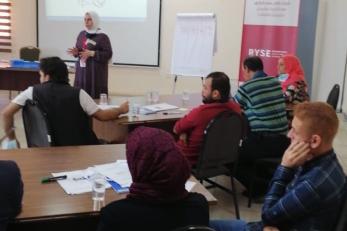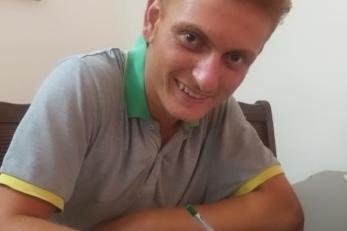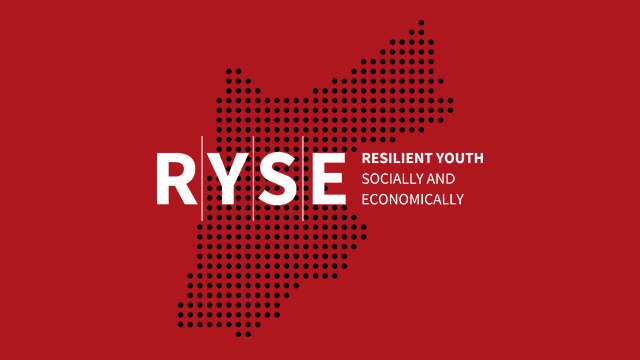The benefits of the “Graduation” Mentoring Program starts to blossom

Early in February 2021, The Resilient Youth Socially and Economically (RYSE) Project started verification visits for targeted families in Irbid, Ajloun, and Al Mafraq. The main goal of these visits was to examine whether the household qualified to be enrolled in the Economic Empowerment component of the program according to adopted vulnerability metrics. Metric examples include access to resources and income/expenditure disparities, psychosocial vulnerabilities unique to displaced households such as socio-economic exclusion and stress associated with conflict-related trauma. The graduation approach model will primarily focus on intensive skill building for formal employment as well as significant investment in experiential learning. Further, this is the first time that the graduation model is being adapted to and implemented in a middle-income country. The graduation approach is a sequenced, multi-sector intervention that supports the poorest and most vulnerable household to achieve sustained income and move out of extreme poverty within a specified period. Using this framework, the RYSE consortium adapted and contextualized the core elements of the graduation approach for the proposed intervention.
The program is also harnessed with the mentorship component, mentors are provided with structured and intensive training encompassing diverse and holistic concepts that can determine the success of the graduation model inter alia dealing with self-esteem, stress management, communications, goal setting, financial literacy, and financial management fundamentals, entrepreneurship, and understanding microbusiness. The purpose is to enable mentors to assess the household members’ comprehension and application potential from training they receive and to succeed in achieving the project’s goal of starting their own microbusiness or finding long term employment opportunities for the youth members of the family.
Amer Al Zoubi is a household head to one of the enrolled families in the program. During their verification visit, the mentors noticed that Amer’s 18 year-old son, Mohammed, was extremely shy and avoided interacting with female members of the visiting team. When the mentors asked his parents about him they mentioned that their son is an introvert in nature and is not involved in social events, he works as a construction worker and rarely leaves the village they live in. Mohammed also doesn’t prefer to work or be around girls. However, Mohammed’s sister–a university student–was quite the opposite, she was outspoken, she responded to the visiting team’s questions, and talked about her future dream, while Mohammed was not interacting in the conversation and was constantly looking at the ground.
On the first mentoring visit to the same family, Mentor Mohammed Abu Ghareebeh took the chance to focus on a one-to-one conversation with the shy son of the family, by asking him questions about his daily work. Mohammed–the male youth member of the family–started to open up in the conversation with the mentor. Although his sister wished to be selected as the targeted youth member of this family, the mentors – Mohammed and Manal Kharabsheh who were responsible for the follow-up, sensed that the young son Mohammed was in greater need from his sister to be targeted for the graduation model.
In the following household mentor visits, the mentors’ team sought to convince Mohammed’s father to choose his son for participating as the youth target member of the family in the graduation model. The father expressed his concern that his son might not be committed in the training program, and mentioned that his daughter would be more committed.
The mentors’ team didn’t lose hope to convince the father of letting his son participate in the program by stressing that this could be a great chance for Mohammed to mingle with other youth people during the training programs and break the shyness barrier in his life. Eventually, the father accepted the idea and Mohammed was very happy to join the program as a selected youth.
On his first day in the training intended for youth, Mohammed came with his mother and started to meet new young people his age. He was so excited to participate that on the next training sessions he started to come by himself. He used to be present on time and participate actively in the training’s conversations. So far, Mohammed completed two training programs: Protection and Financial Literacy.
On the following mentor visits, the mentor team noticed the great change in Mohammed’s open attitude to people; where he talked about his future dream of starting his own microbusiness, a butcher shop. Upon discussing the budgeting plan with the family, Mohammed took the lead to talk about saving tactics and rational consumption with his dad; he was willing to help in the expenses distribution and proper consumption of his family.

In light of Mohammed’s story, systematic and intensive interaction with graduation participants has proved to increase the likelihood of successful outcomes around improved financial management and interpersonal relationships within family members and the outer community, thereby building improved social capital through access to networks and community resources.
The mentor’s team was able to build a trusting relationship with the family and, in turn, work with them to address potential social and cultural barriers impeding youth’s access to possible livelihood opportunities.
With reference to his active participation in the Financial Literacy training, Mohammed mentions to the mentors’ team: “through the financial literacy training I learned how to save money and be cautious not to spend all my deposit by keeping savings for the future such as when I will need the money for my new business.”
After not having a vision for his future, Mohammed acknowledges that things have changed for him, he now has a vision and a dream to follow.
In the course of the graduation intervention, Mercy Corps, through its RYSE team will continue to provide intensive training programs to 194 targeted youth in areas such as microbusiness management, life skills, on-the-job training and selected schemes of market-driven vocational training, with the purpose of securing decent long-term jobs for youth or to equip them with the right skills and resources to start their own microbusinesses. The team will also link young people with the right social and economic networks that can guarantee their potential success.
The RYSE project adopts a pioneering model to activate the role of youth, governments and private sector companies, whereby investors and civil society organizations educate and empower youth to become positive change agents and leaders within their communities. This project works to empower youth through three main components: The first component provides life skills, training, and pathways for youth to become leaders working in civil society. The second component provides a comprehensive approach to help young people obtain the training and support needed to achieve sustainable livelihoods. Finally, the third component deals with formal societal structures that prevent youth from actively participating in civil society and the labor market.
